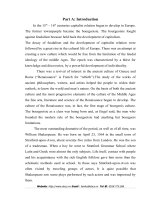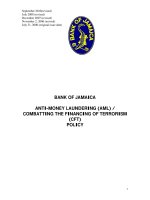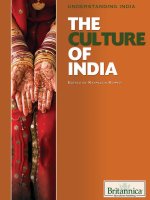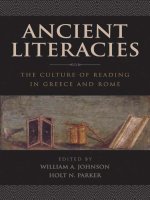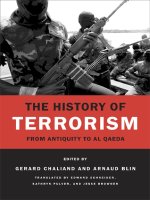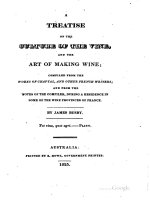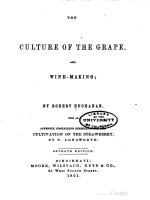The culture of terrorism noam chomsky
Bạn đang xem bản rút gọn của tài liệu. Xem và tải ngay bản đầy đủ của tài liệu tại đây (882.4 KB, 333 trang )
Tai Lieu Chat Luong
The Culture of
Terrorism
Noam Chomsky
Pluto Press
London
4
Copyright © Noam Chomsky, 1988, 1989
Book printed in the United States of America
British Library Cataloguing in Publication Data
Chomsky, Noam.
The culture of terrorism
1. United States — Foreign relations —1981I. Title
7.73 E876
ISBN 0-7453-0269-6
ISBN 0-7453-0270-X Pbk
Digital processing by The Electric Book Company
20 Cambridge Drive, London SE12 8AJ, UK
www.elecbook.com
Classics in Politics: The Culture of Terrorism
Noam Chomsky
5
Contents
Preface........................................................................................ 7
Notes Preface............................................................................. 11
INTRODUCTION The Public and State Violence .............................. 12
Notes Introduction ...................................................................... 16
PART ONE The Scandals of 1986................................................ 17
1 The Challenge ......................................................................... 18
Notes Chapter One...................................................................... 34
2 The Cultural-Historical Context .................................................. 37
Notes Chapter Two ..................................................................... 49
3 The Problems of Clandestine Terrorism ....................................... 52
Notes Chapter Three ................................................................... 77
4 The Limits of Scandal............................................................... 83
Notes Chapter Four..................................................................... 93
5 The Culture of Terrorism ........................................................... 96
Notes Chapter Five ....................................................................136
6 Damage Control......................................................................146
Notes Chapter Six ......................................................................166
7 The Perils of Diplomacy...........................................................170
Classics in Politics: The Culture of Terrorism
Noam Chomsky
6
Notes Chapter Seven..................................................................214
8 The Reality That Must Be Effaced: Iran and
Nicaragua.................................................................................221
Notes Chapter Eight ...................................................................246
PART TWO Further Successes of the Reagan
Administration...........................................................................252
9 Accelerating the Race Towards Destruction ...............................253
Notes Chapter Nine....................................................................257
10 Controlling “Enemy Territory” .................................................258
Notes Chapter Ten .....................................................................261
11 Freedom of Expression in the Free World .................................262
Notes Chapter Eleven .................................................................274
PART THREE The Current Agenda ..............................................277
12 The Threat of a Good Example................................................278
Notes Chapter Twelve ................................................................285
13 The Fledgling Democracies.....................................................287
Notes Chapter Thirteen...............................................................314
14 Restoring Regional Standards .................................................320
Notes Chapter Fourteen ..............................................................324
15 Standards for Ourselves .........................................................325
Notes Chapter Fifteen.................................................................331
16 Prospects.............................................................................332
Notes Chapter Sixteen ................................................................334
Classics in Politics: The Culture of Terrorism
Noam Chomsky
Preface
7
Preface
T
his essay on the culture of terrorism is based on a December
1986 “postscript” for several foreign editions of my book Turning
the Tide.1 I had originally intended to update the same material
for a new U.S. edition, carrying it through the Iran-contra hearings, but it
took on a rather different character in the course of rewriting, so I have
prepared it for separate publication. I will, however, generally assume
the discussion in Turning the Tide and the further elaboration in On
Power and Ideology as background, without specific reference.
This earlier material dealt with several topics: the travail of Central
America; the principles that underlie U.S. policy planning as revealed by
the documentary record; the application of these principles in Third
World intervention, primarily with regard to Central America and the
Caribbean; the application of the same principles to national security
affairs and interactions among the industrial powers; and some relevant
features of domestic U.S. society. The central—and not very surprising—
conclusion that emerges from the documentary and historical record is
that U.S. international and security policy, rooted in the structure of
power in the domestic society, has as its primary goal the preservation
of what we might call “the Fifth Freedom,” understood crudely but with
a fair degree of accuracy as the freedom to rob, to exploit and to
dominate, to undertake any course of action to ensure that existing
privilege is protected and advanced. This guiding principle was
overlooked when Franklin Delano Roosevelt announced the Four
Freedoms that the U.S. and its allies would uphold in the conflict with
Classics in Politics: The Culture of Terrorism
Noam Chomsky
Preface
8
fascism: freedom of speech, freedom of worship, freedom from want,
and freedom from fear.
The internal documentary record of U.S. planning and, more
importantly, the unfolding historical events themselves yield ample
evidence to evaluate the significance attached to the Four Freedoms in
doctrine and in practice, and to demonstrate their subordination to the
Fifth Freedom, the operative principle that accounts for a substantial
part of what the U.S. government does in the world. When the Four
Freedoms are perceived to be incompatible with the Fifth, a regular
occurrence, they are set aside with little notice or concern.
To pursue programs that are conceived and applied in these terms,
the state must spin an elaborate web of illusion and deceit, with the
cooperation of the ideological institutions that generally serve its
interests—not at all surprisingly, given the distribution of domestic
wealth and power and the natural workings of the “free market of ideas”
functioning within these constraints. They must present the facts of
current history in a proper light, conducting exercises of “historical
engineering,” to use the term devised by American historians who
offered their services to President Wilson during World War I:
“explaining the issues of the war that we might the better win it,”
whatever the facts may actually be. It has commonly been understood
that the responsibility of the serious academic historian and political
scientist, as of political leaders, is to deceive the public, for their own
good. Thus the respected historian Thomas Bailey explained in 1948
that “Because the masses are notoriously short-sighted and generally
cannot see danger until it is at their throats, our statesmen are forced to
deceive them into an awareness of their own long-run interests,” a view
recently endorsed by the director of Harvard University’s Center of
International Affairs, Samuel Huntington, who wrote in 1981 that “you
Classics in Politics: The Culture of Terrorism
Noam Chomsky
Preface
9
may have to sell [intervention or other military action] in such a way as
to create the misimpression that it is the Soviet Union that you are
fighting. That is what the United States has done ever since the Truman
Doctrine.” An accurate assessment, which applies very aptly to Central
America today. The academic world too must be rallied to the cause. In
his presidential address to the American Historical Association in 1949,
Conyers Read explained that
we must clearly assume a militant attitude if we are to survive ...
Discipline is the essential prerequisite of every effective army
whether it march under the Stars and Stripes or under the
Hammer and Sickle ... Total war, whether it be hot or cold, enlists
everyone and calls upon everyone to assume his part. The
historian is no freer from this obligation than the physicist ... This
sounds like the advocacy of one form of social control as against
another. In short, it is.2
In general, it is necessary to ensure that the domestic population
remains largely inert, limited in the capacity to develop independent
modes of thought and perception and to formulate and press effectively
for alternative policies—even alternative institutional arrangements—that
might well be seen as preferable if the framework of ideology were to be
challenged.
Subsequent events illustrate very well the theses developed in the
earlier material to which I referred above. I will review a number of
examples, including the “scandals” that erupted in late 1986 and their
consequences, and the new demands that these developments posed for
the ideological system. The scandals elicited a good deal of commentary
and reflection on our political institutions and the way they function.
Much of it, I think, is misguided, for reasons that I will try to explain as
Classics in Politics: The Culture of Terrorism
Noam Chomsky
Preface
10
we proceed. My main concern will be to assess what we can learn about
ourselves, particularly about the dominant intellectual culture and the
values that guide it,3 from an inquiry into recent events and the reaction
to them at a critical moment of American life.
Dedication to the Fifth Freedom is hardly a new form of social
pathology. Nor, of course, was it an invention of the “white hordes” who,
“fortified in aggressive spirit by an arrogant, messianic Christianity” and
“motivated by the lure of enriching plunder, ... sallied forth from their
western European homelands to explore, assault, loot, occupy, rule and
exploit the rest of the world” during the nearly six centuries when
“western Europe and its diaspora have been disturbing the peace of the
world”—as the advance of European civilization is perceived, not
without reason, by a perceptive African commentator.4 But this vocation
of the powerful constantly assumes new forms—and new disguises, as
the supportive culture passes through varying stages of moral cowardice
and intellectual corruption.
As the latest inheritors of a grim tradition, we should at least have the
integrity to look into the mirror without evasion. And when we do not
like what we see, as we most definitely will not if we have the honesty
to face reality, we have a far more serious moral responsibility, which
should be obvious enough.
Cambridge, Massachusetts
October 1987
Classics in Politics: The Culture of Terrorism
Noam Chomsky
Preface
11
Notes Preface
1.
2.
3.
4.
Turning the Tide (South End, 1985), henceforth TTT. The “postscript”
has appeared in the Canadian and Italian editions (Black Rose
(Montreal), 1987; Eleuthera (Milan), 1987). See also my On Power and
Ideology (South End, 1987; henceforth, PI), a series of lectures delivered
in Managua in 1986, dealing with similar themes.
For sources and more general discussion, see my Towards a New Cold
War (Pantheon, 1982), chapter 1, drawing particularly on Jesse
Lemisch, On Active Service in War and Peace: Politics and Ideology in
the American Historical Profession (New Hogtown Press (Toronto),
1975), an important study, unread for the usual reasons: wrong
message. Lemisch was one of the many young scholars eliminated from
the universities during the little-known but extensive academic repression
of the left during the 1960s, on the grounds that his “political concerns
interfered with his scholarship”—meaning, he failed to adopt the proper
“political concerns.” Many illusions have been fostered about what
happened in the universities in those years of conflict, when the rigid
ideological barriers were breached to a limited extent, but at a serious
cost to many of the young people who achieved this important result.
Huntington, in International Security, Summer, 1981.
A related and very significant question, which I do not attempt to
address, is the shaping of the popular culture for the general public in
television, cinema, mass circulation journals, educational practice, and
so on.
Chinweizu, The West and the Rest of Us: White Predators, Black Slavers
and the African Elite (Vintage, 1975), 3.
Classics in Politics: The Culture of Terrorism
Noam Chomsky
Introduction
12
INTRODUCTION
The Public and State Violence
T
he 1986 “scandals” and their aftermath are instructive for those
who are concerned to understand American society, and
particularly, for those who hope to change its character and
course. Temporarily at least, the scandals caused some disarray and
retreat among state planners and ideologists, discrediting certain of the
more violent policies as they were partially exposed. These
developments encouraged moves within Central America towards the
kind of political settlement that would long have been possible had it not
been for the commitment of the United States to establish its own terms
by force. Even if successful, these steps could not in themselves lay the
groundwork for confronting the deep-seated problems facing the
societies of Central America, problems that result in no small measure
from earlier U.S. intervention in the region, where the U.S. has been the
dominant outside influence through the century. But if domestic
inhibitions suffice to constrain the advocates of force in Washington,
then there might be a respite from the worst terror, and a small window
of opportunity might open for constructive efforts to overcome the legacy
of a bitter past.
The scandals of 1986, in turn, are a tribute to the popular
movements that developed in the 1960s and that have not been tamed,
despite major efforts by business, government and intellectual elites in
the post-Vietnam period. This important fact will not be the topic of
books and articles, and indeed will not penetrate to official history, just
Classics in Politics: The Culture of Terrorism
Noam Chomsky
Introduction
13
as the comparable lesson of the Vietnam years can hardly be recognized
within an ideological system dedicated to the service of power. It is
important, however, or concerned citizens to think through the matter for
themselves, and to understand just how the public was able to influence
state policy.
During the Vietnam years, the public played a significant though
indirect role in influencing policy. Evidently, the influence was not
expressed through the electoral system; a 2-1 vote for the “peace
candidate” in 1964 did not deter Lyndon Johnson and his associates
from carrying out the plans for escalation they were in the process of
developing while the election was won on the promise that we do not
want a wider war. But as the Vietnam war escalated through the stages
of subversion, state terrorism, and outright U.S. aggression, 1 disaffection
and protest among the public became a significant force, preventing the
government from declaring the national mobilization that would have
been required to win what was becoming a major war. The effort to fight
a “guns and butter war” so as to pacify an increasingly restive public
gave rise to severe economic problems. These were a factor in leading
elite elements to urge that the enterprise be reduced in scale or
liquidated by early 1968. The general dissidence, particularly among the
youth, was perceived in elite circles as a serious problem in itself by
1968, while within the Pentagon, there was concern that sufficient
military force be held in reserve to control domestic disorder if the U.S.
aggression visibly increased. The key phrase is “visibly”; it was fear of
the public that led to the expansion of clandestine operations in those
years, on the usual principle that in our form of democracy, if the public
escapes from passivity, it must be deceived—for its own good. The
collapse of will among the troops in the field, influenced by rising
dissidence at home, also became a matter of elite concern, teaching the
Classics in Politics: The Culture of Terrorism
Noam Chomsky
Introduction
14
lesson that it was a mistake to employ a citizen’s army to fight a brutal
colonial war rather than mercenary forces, foreign or locally recruited, as
has been traditional practice. These problems convinced economic and
political elites to change course after the Tet offensive of January 1968
made it clear that military victory remained a distant prospect without
escalation of the sort that the population would not easily tolerate.
Similar factors inhibited U.S. intervention in Central America in the
1980s. The scale of domestic dissidence was greater and it was more
broadly based than at comparable stages of the Indochina wars. The
Reagan administration was therefore unable to carry out the KennedyJohnson transition from state terrorism to direct aggression. Had the
public been quiescent, it would have been possible for Reagan to send
the Marines in the style of Lyndon Johnson when it became necessary to
avert the threat of democracy in the Dominican Republic in 1965, or to
emulate John F. Kennedy, who sent the U.S. Air Force to bomb and
defoliate South Vietnam to counter what his administration called
“internal aggression” there. Much to the dismay of U.S. elites, direct
aggression is now impeded by the enemy of the state at home, the
domestic population, and the resort to indirect means brings with it
inevitable problems. Devious means are less efficient than the direct
exercise of violence. Furthermore, despite the general loyalty of the
ideological institutions, there is a risk of exposure. When suppression is
no longer possible, some opposition will be aroused among groups that
are concerned to protect their own power and prerogatives (Congress, in
the present case). And no less seriously, the exposures tend to
undermine the rhetoric that is used to pacify the general population—in
particular, the hypocritical pose of “combating terrorism” regularly
affected by some of the world’s leading terrorist commanders, but
difficult to sustain when they are found to be dealing with Iran.
Classics in Politics: The Culture of Terrorism
Noam Chomsky
Introduction
15
Domestic dissidence was the essential factor that forced state terror
underground in the 1980s, leading to problems when certain of its
facets were exposed to a broad public during the scandals of 1986. I
will return to these recent developments and their immediate
background, but it is important not to allow the central conclusion to be
effaced in a welter of detail.
The most important conclusion to be drawn from these events is that
they demonstrate, once again, that even in a largely depoliticized society
such as the United States, with no political parties or opposition press
beyond the narrow spectrum of the business-dominated consensus, it is
possible for popular action to have a significant impact on policy, though
indirectly. That was an important lesson of the Indochina wars. It is
underscored, once again, by the experience of the 1980s with regard to
Central America. And it should be remembered for the future.
Classics in Politics: The Culture of Terrorism
Noam Chomsky
Introduction
16
Notes Introduction
1.
Needless to say, these are not the conventional terms used to describe
what happened during those years. But they are the accurate terms. For
discussion, see several essays in my Towards a New Cold War, and
sources cited there. On the conventional interpretation as the war
progressed and since, particularly in the media, see Edward Herman and
Noam Chomsky, The Political Economy of the Mass Media (Pantheon,
1988), chapters 5, 6.
Classics in Politics: The Culture of Terrorism
Noam Chomsky
The Challenge
17
PART ONE
The Scandals of 1986
Classics in Politics: The Culture of Terrorism
Noam Chomsky
The Challenge
18
1
The Challenge
T
he scandals that erupted in the Fall of 1986 and the reaction to
them cast a revealing light on the political system and the
intellectual culture that interprets and sustains it. As we shall see
in detail below, these events demonstrated that the United States
remains dedicated to the rule of force, that political elites agree and
indeed insist that it must remain so, and that, furthermore, the
commitment to violence and lawlessness frames their self-image as well,
barely concealed beneath deceptive rhetoric. These conclusions can
readily be drawn from the actual record, if we face it honestly and
without illusion. They have serious implications for the future, just as the
same conclusions in earlier days, no less readily established, no less
regularly suppressed, have had profound consequences in the past.
With regard to Central America, the scandals disrupted a tacit elite
consensus, troubled by some tactical disagreements over generally
shared goals. They imposed new demands for the ideological system,
which must control the domestic damage and ensure that it is confined
within narrow and politically meaningless bounds while dedicating itself
anew to the major and continuing task: to fashion an appropriate version
of the real scandals of the 1980s so as to place U.S. actions in a
favorable light and thus to ensure that similar policies can proceed
without serious impediment when they are considered necessary.
This task gained new urgency in June 1986, as the World Court
issued its long-expected judgment condemning the United States for its
attack against Nicaragua, and Congress voted aid for the contras,
Classics in Politics: The Culture of Terrorism
Noam Chomsky
The Challenge
19
endorsing the illegal use of force while “asserting that it was the only
way to get the Sandinistas to negotiate seriously”—five days after
Nicaragua had accepted the latest draft of the Contadora treaty, rejected
by the U.S. and its clients.1 “This is for real. This is a real war,” a U.S.
government official commented, confirming the judgment of Nicaraguan
President Daniel Ortega that the congressional vote “amounted to a
declaration of war.”2
The media and the general intellectual community had largely
accepted and internalized the basic framework of government doctrine
throughout, but with the virtual declaration of war, under these
circumstances, it became necessary to pursue the task of imposing a
suitable doctrinal structure with renewed vigor. Specifically, since we
have declared war against Nicaragua and established a functioning
terrorist state in El Salvador, it must be true—and therefore it is true—
that Nicaragua is a brutal one-party dictatorship devoted to torture and
oppression while the resistance who courageously fought “the former
dictator” Somoza3 now fight for freedom and democracy against the new
dictator Ortega imposed by Soviet imperialism; correspondingly, it is
necessarily the case that El Salvador, like Guatemala and Honduras, is a
“fledgling democracy” marching forward towards the Four Freedoms
thanks to our fervent love of liberty. If the facts show otherwise, then so
much the worse for the facts.
The task of constructing a usable version of history and the current
scene confronted further obstacles in the summer of 1987. Despite a
substantial military effort by the United States, the much-heralded
Spring Offensive of “the sons of Reagan,” as the marauders of the proxy
army announce themselves when swooping down on barely defended
farms and villages to kill and destroy, achieved no military victories that
could be flaunted to convince wavering legislators that the exercise of
Classics in Politics: The Culture of Terrorism
Noam Chomsky
The Challenge
20
violence might succeed; organizing achievements among the Nicaraguan
populace are not even a topic for consideration. What was worse, the
disarray caused by the scandals encouraged U.S. allies, Costa Rica in
particular, to risk the wrath of Washington and proceed in the course of
diplomacy.
The Reagan administration had succeeded in undermining the
initiatives of the major Latin American governments, expressed through
the efforts of the Contadora nations, to find a way to a political
settlement, and the commitment to obstruct these efforts persisted
through 1987. Nevertheless, Costa Rican President Oscar Arias, with
the support of Guatemala, continued to press a plan unacceptable to
Washington, which responded by repeated efforts to undermine it to
which we return, and direct punishment of Costa Rica for its
transgressions. U.S. assistance to the ailing Costa Rican economy was
suspended in March 1987 as Arias proceeded with his plan over
Washington’s objections, along with commercial U.S. bank loans to
Costa Rica, as Washington refused, for the first time, to intervene on
Costa Rica’s behalf, prejudicing Costa Rican efforts to obtain other
international loans as well; Costa Rican exports to the U.S. were cut by
government bans and restrictions; and U.S. diplomatic pressures forced
the resignation of an adviser to President Arias who had been
instrumental in formulating the peace plan, according to Costa Rican
officials. While Costa Rica was lined up in Washington’s crusade to
overthrow the Sandinistas, two reporters in San José observe, “U.S. aid
soared to more than $200 million annually. ‘Costa Rica has not received
a penny [of U.S. aid] since almost the beginning of the peace plan effort.
That, of course, is purely coincidental,’ one Arias insider remarked
sarcastically.” The Council on Hemispheric Affairs reports that
“According to Costa Rican officials, the Reagan Administration’s delay in
Classics in Politics: The Culture of Terrorism
Noam Chomsky
The Challenge
21
recently appointing a new ambassador for more than seven months is a
sign of its displeasure with Arias’s diplomatic moves in the region. One
Arias aide said that for Washington ‘this embassy is not here for
dialogue or political development in Costa Rica. It’s still here with the
aim of creating a southern front [for the contras]’.”4
These topics are generally ignored, despite their obvious significance,
in conformity with the principle that the state sets the agenda of concern
for respectable opinion. Within that framework, tactical debate is
legitimate, but the bounds must not be transgressed. This principle is a
corollary to the requirement that the public must be deceived, if it is not
quiescent. We shall see many further instances as we proceed.
Despite extreme U.S. hostility, the efforts to achieve a diplomatic
settlement persisted through 1987. With the support of the Contadora
nations, serving as crucial intermediaries, the Central American
presidents reached a tentative peace agreement in August 1987,
shocking the administration and threatening to undercut its efforts
throughout the past years to prevent a diplomatic settlement. Given that
the comparative advantage of the United States lies in its unparalleled
means of violence, while it lacks any political appeal in the region apart
from favored military and wealthy elites to whose rule and privilege it is
committed, it is natural that the U.S. government should consistently
prefer the arena of force to that of diplomacy, and so it has. In contrast,
Nicaragua has sought throughout to pursue the path of diplomacy,
calling for international monitoring of borders, elimination of foreign
bases and advisers so as to reduce security concerns, etc., while
accepting proposals for a general (Contadora-initiated) treaty, taking the
conflict to the International Court of Justice and the United Nations
Security Council and General Assembly as required by international
convention, and so on.
Classics in Politics: The Culture of Terrorism
Noam Chomsky
The Challenge
22
We return to the specifics, but there is no real question that these are
the essential facts, and they are plainly unacceptable.
To face the task of purification of history posed by the Central
American accords of August 1987, it was necessary to adopt a new
stance, outlined with precision by Robert Hunter, senior fellow at the
Center for Strategic and International Studies, consultant for the National
Bipartisan (Kissinger) Commission on Central America, and respected
commentator on international affairs. We must regretfully concede that
the contras proved an inadequate instrument for “forcing pluralism on
the Sandinistas” and that the “price of democracy in Nicaragua” can
only be paid “by sacrificing American lives,” too great a sacrifice even for
a state so caring and benevolent as ours:
By contrast, the contras seem to have been instrumental in
achieving another, less noticed goal of US policy: acceptance by
Nicaragua of a peace process that can be used to reduce security
threats in the region. This goal, less ambitious than a Sandinista
overthrow, has the virtue of broad support across the US political
spectrum.5
This explanation of the virtues of the less noticed-goal, however,
overlooks one slight flaw in the argument: the goal could readily have
been achieved at any time in the preceding years by accepting the
diplomatic options urged and pursued by the Nicaraguan enemy,
adamantly rejected at every turn by the Reagan administration. This
perception being entirely unacceptable, it must be exorcised, and a more
fitting history must be enshrined along the lines that Hunter outlines. As
explained by James Rohwer in the New York Times, it was “America’s
pugnacity over the last several years” that compelled Nicaragua to
accept the conditions of the peace settlement (namely, those it had been
Classics in Politics: The Culture of Terrorism
Noam Chomsky
The Challenge
23
requesting for six years against unceasing U.S. opposition), conditions
that will secure borders and remove security threats and thus will
prevent Nicaragua from overrunning its neighbors, if not threatening the
United States itself, and will compel these Hitlerian aggressors to “keep
Nicaragua’s miseries to itself”—these miseries, of course, being entirely
their responsibility, having nothing to do with “America’s pugnacity.”6
This “pugnacity” and its effects merit only admiration and approval,
within the culture of terrorism.
While the standard argument offered by Robert Hunter is
transparently absurd, and the variant offered by James Rohwer merits
somewhat harsher terms, one might imagine a more sophisticated
version: “America’s pugnacity” compelled the totalitarian Sandinistas to
accept terms that call for their internal democratization, along with a
lessening of their threat to their neighbors, namely, the terms of the
August 1987 accords, which previously they refused to accept. It is
noteworthy that the argument is not offered, but that is for other
reasons: no arguments are required during the incantation of state
propaganda. But let us consider this argument nonetheless. It is readily
tested. We simply inspect the diplomatic record to determine when the
United States, or anyone else, offered Nicaragua the option of accepting
a treaty which terminated U.S. support for its proxy army in return for
the internal moves called for in the August accords in all countries of the
region, and we ask when Nicaragua rejected this option, compelling the
United States to resort to “pugnacity” to achieve these long-desired
goals. We quickly discover, again, that the United States never
contemplated such a proposal, and has undermined the diplomatic
process from the start, and still does: the Reagan administration at once
demonstrated the hostility towards the August 1987 agreements that is
traditional when diplomacy or international law interfere with the
Classics in Politics: The Culture of Terrorism
Noam Chomsky
The Challenge
24
preferred route of violence. The real reasons for “America’s pugnacity” lie
elsewhere, and they are obvious enough, but, being unacceptable, they
cannot be considered in the cultural mainstream.
There can be little doubt that this enterprise of historical engineering
will succeed, just as similar ones have in the past. Its manifest absurdity
is unlikely to prove an impediment for the dominant intellectual culture.
We return to a closer look at how these problems have evolved and have
been addressed, and how the basis has been laid for assuring that they
will be successfully solved, as in the past, with impressive consistency
and a regular display of piety and self-righteousness.
The doctrinal truths must be driven home forcefully and incessantly,
because more is at stake than merely providing a justification for what
has been done. A basis must be laid for the continuing resort to violence
in the likely event that a political settlement will not suit U.S. demands
and will therefore be undermined—by enemy treachery, the required
conclusion whatever the facts, therefore the one that must be
established as doctrine. And what more fitting argument could there be
than the “historical fact” that only through the use of force was it
possible to drive the enemy to the bargaining table in the first place.
Furthermore, similar situations are bound to arise in the future, and
historical engineering must ensure, without delay, that the proper
arsenal of lessons will be available, to be deployed when needed.
In pursuit of these objectives, the current situation may be obscured
by the usual technique of selective focus and interpretation that adheres
to approved principles, or simply by outright falsification or suppression
of unacceptable fact. As for the past, it is plainly irrelevant, since we
have undergone a miraculous conversion and have changed course—
despite the fact that the institutional structures and planning system that
lie behind past atrocities remain intact and unchallenged, and there is
Classics in Politics: The Culture of Terrorism
Noam Chomsky
The Challenge
25
little recognition in the intellectual or popular culture of what has
happened in reality, apart from those (not insignificant) sectors of
popular nonelite opinion that remain stricken by the “Vietnam
syndrome.”
The doctrine of “change of course,” which allows any past horror to
be cheerfully dismissed, is highly functional within a terrorist culture. It
is presented in its most vulgar form by 1987 Pulitzer Prize winner
Charles Krauthammer, who assures us that “today’s America is not
Teddy Roosevelt’s or Eisenhower’s or even that imagined by Ronald
Reagan, the candidate.” Now “democracy in the Third World has
become, for the right as well as the left, a principal goal of American
foreign policy.” While it is true that “liberty has not always been the
American purpose,” now all has changed: “We believe in freedom,” and
the past can be consigned to oblivion along with all that it teaches us
about American institutions and the way they operate.7 As for the
present, it will be rendered with the same scrupulous concern for
accuracy and honest self-criticism that was exhibited during past eras
when, we now concede in retrospect, there may have been an
occasional blemish.
A more sophisticated version of this valuable doctrine is offered by
the editors of the conservative London Spectator, who are able to
perceive that “the sudden attachment of the United States to pluralist
democracy in Central America in general, and Nicaragua in particular,
may seem a little strange” in the light of the historical record, and that
“this hypocrisy, as some see it, has deprived the Americans of
credibility.” But, they continue, such a reaction is improper, because it
“assumes no nation has a right to act unless it has been perfectly
consistent through the ages”; “cases have to be decided on their own
merits,” and the case for a war against Nicaragua is “apparent to all but
Classics in Politics: The Culture of Terrorism
Noam Chomsky
The Challenge
26
western marxistant visitors, dazzled as they always are by the glories of
low-cost housing projects, women’s groups and universal measles
vaccination.” In contrast, wealthy and privileged sectors of the West
show proper contempt for such absurdities, preferring the wise
reflections of Winston Churchill, who observed to his colleague Joseph
Stalin in 1943 that
the government of the world must be entrusted to satisfied
nations, who wished nothing more for themselves than what they
had. If the world-government were in the hands of hungry nations,
there would always be danger. But none of us had any reason to
seek for anything more. The peace would be kept by peoples who
lived in their own way and were not ambitious. Our power placed
us above the rest. We were like rich men dwelling at peace within
their habitations.
Enjoying this happy state as a result of our virtue and good works, we
are entitled to sneer disdainfully at ridiculous attempts to save children
dying of disease, provide housing for the poor and starving, offer women
the possibility of escaping from slavery and degradation, and other such
childish nonsense in “hungry nations” unsatisfied with their proper lot.8
For all their astuteness, however, the editors still miss a few small
points: (1) contrary to what they allege, the United States (along with
“satisfied nations” generally) is quite consistent in its choice of targets of
violence and its selective concerns, as the historical record shows, and
the reasons are explained with sufficient clarity in internal documents;
(2) ideological managers are equally consistent in concealing these
striking regularities, which can readily be grasped once we escape the
confines of convenient dogma; (3) the United States has no commitment
“to pluralist democracy in Central America,” but, rather, has dedicated
Classics in Politics: The Culture of Terrorism
Noam Chomsky
